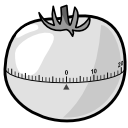
This post is about the Pomodoro Technique® objective V: Set up a timetable. Instead of writing about how setting up a timetable and respecting work hours helps you keep a sustainable pace and uphold productivity (curiously enough a key XP practice as well :-)), I will focus on the similarities between objective V and a Scrum Sprint.
I think it's striking how well the fifth Pomodoro objective correspond to the essence of iterative development and Sprints.
In the Pomodoro book, Francesco Cirillo makes a couple of points.Other Articles in the Series
Find out how much effort an activity requires
Cut down on interruptions
Estimate the effort for activities
Make the Pomodoro more effective
Set up a timetable
Other possible objectives
A timetable measures the results of the day ... our goal is to carry out the activities listed on it with the highest possible quality within the set timeframe.
The goal of a Sprint is to finish the work items the team has committed to while preserving quality.
If time runs out and these activities aren't done, we try to understand what went wrong.
Well, that sounds like a Sprint retrospective to me.
Francesco goes on explaining that concentrating on the time wasted isn't important: how much work we actually do is. The amount of work completed is carried over to the next iteration.
The same is true for sprints: you review past progress to get an idea about how much is reasonable to put into the next iteration.
Focusing on what has not been done is also bad for morale. Instead, look at what you have achieved, learn from that and think of ways to increase velocity.
However, The strongest point Francesco makes, that Scrum teams can learn from, is this:
The main risk with the timetable is in underestimating how important it is.
I've been on Scrum teams where too much work is systematically put into sprints. Consistently, the team fails to finish the scheduled work. Eventually the sprint loses its purpose: productivity declines alongside people's spirits.
Conclusions
In order to maintain a sustainable pace you need to respect the timeboxes. This is true at all levels:
- Individual Pomodoros
- Daily Timetables
- Development iterations (sprints)
If you don't do this, you partially undermine the purpose of working in short iterations, whether a Pomodoro or Sprint.


Interesting topic and can be useful for college, but by now I have no time and just going to get at least essay easy help to met the deadline.
ReplyDelete